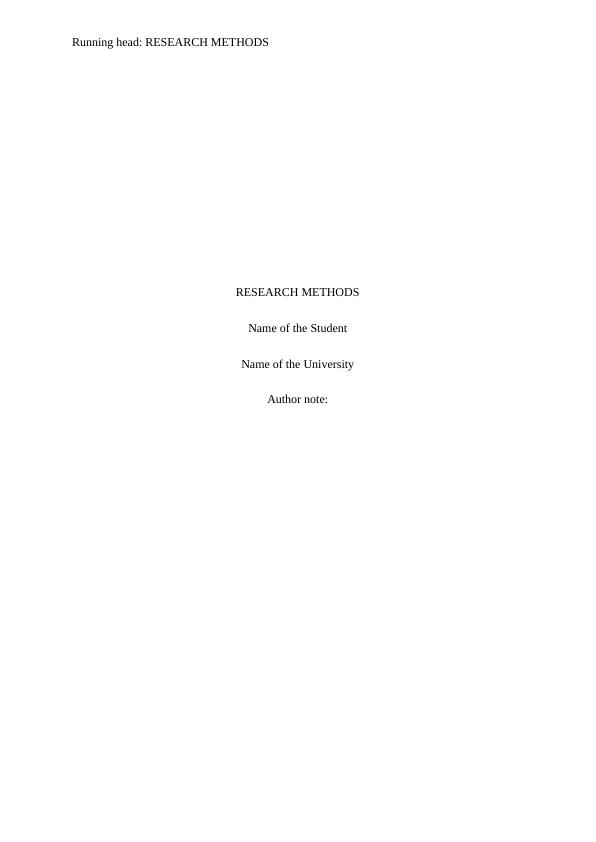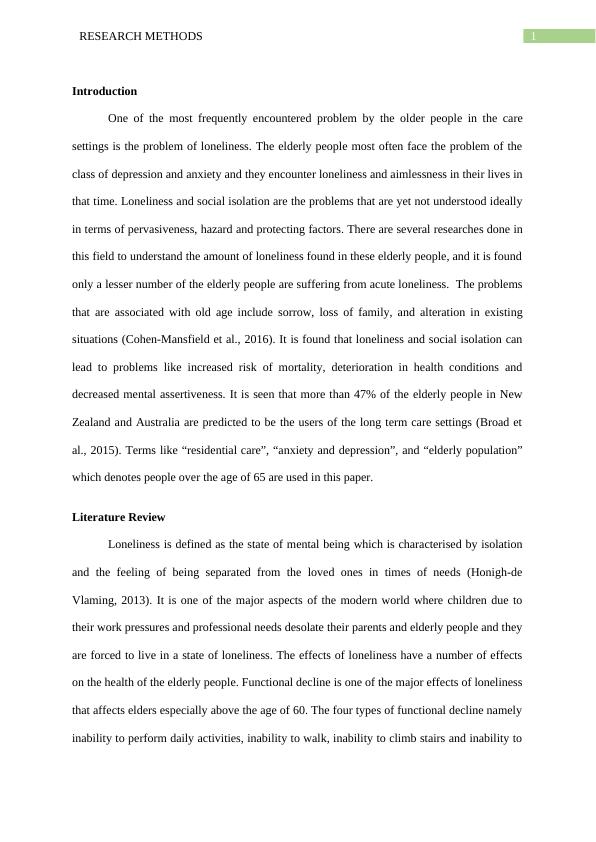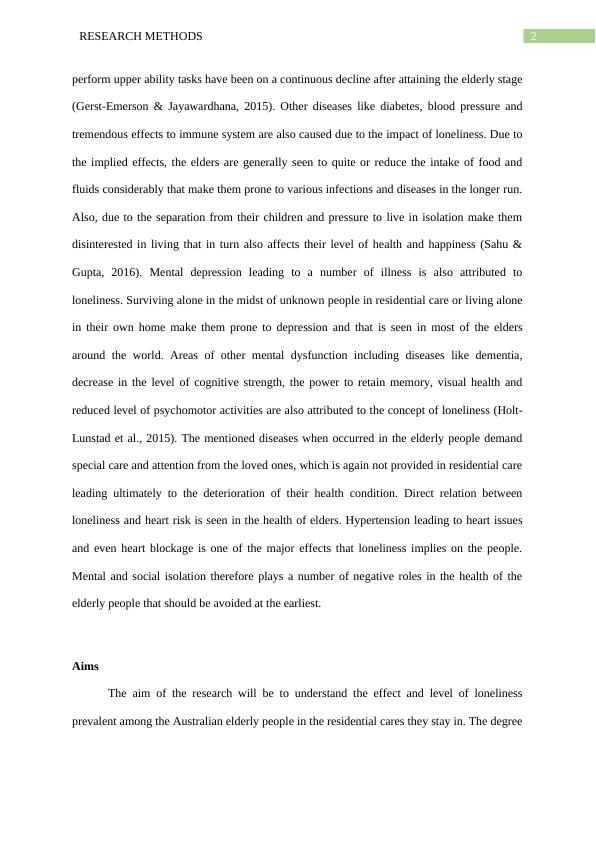Loneliness Among Elderly People in Residential Care: Causes, Effects and Solutions
Added on 2023-06-11
9 Pages2135 Words382 Views
Running head: RESEARCH METHODS
RESEARCH METHODS
Name of the Student
Name of the University
Author note:
RESEARCH METHODS
Name of the Student
Name of the University
Author note:

1RESEARCH METHODS
Introduction
One of the most frequently encountered problem by the older people in the care
settings is the problem of loneliness. The elderly people most often face the problem of the
class of depression and anxiety and they encounter loneliness and aimlessness in their lives in
that time. Loneliness and social isolation are the problems that are yet not understood ideally
in terms of pervasiveness, hazard and protecting factors. There are several researches done in
this field to understand the amount of loneliness found in these elderly people, and it is found
only a lesser number of the elderly people are suffering from acute loneliness. The problems
that are associated with old age include sorrow, loss of family, and alteration in existing
situations (Cohen-Mansfield et al., 2016). It is found that loneliness and social isolation can
lead to problems like increased risk of mortality, deterioration in health conditions and
decreased mental assertiveness. It is seen that more than 47% of the elderly people in New
Zealand and Australia are predicted to be the users of the long term care settings (Broad et
al., 2015). Terms like “residential care”, “anxiety and depression”, and “elderly population”
which denotes people over the age of 65 are used in this paper.
Literature Review
Loneliness is defined as the state of mental being which is characterised by isolation
and the feeling of being separated from the loved ones in times of needs (Honigh-de
Vlaming, 2013). It is one of the major aspects of the modern world where children due to
their work pressures and professional needs desolate their parents and elderly people and they
are forced to live in a state of loneliness. The effects of loneliness have a number of effects
on the health of the elderly people. Functional decline is one of the major effects of loneliness
that affects elders especially above the age of 60. The four types of functional decline namely
inability to perform daily activities, inability to walk, inability to climb stairs and inability to
Introduction
One of the most frequently encountered problem by the older people in the care
settings is the problem of loneliness. The elderly people most often face the problem of the
class of depression and anxiety and they encounter loneliness and aimlessness in their lives in
that time. Loneliness and social isolation are the problems that are yet not understood ideally
in terms of pervasiveness, hazard and protecting factors. There are several researches done in
this field to understand the amount of loneliness found in these elderly people, and it is found
only a lesser number of the elderly people are suffering from acute loneliness. The problems
that are associated with old age include sorrow, loss of family, and alteration in existing
situations (Cohen-Mansfield et al., 2016). It is found that loneliness and social isolation can
lead to problems like increased risk of mortality, deterioration in health conditions and
decreased mental assertiveness. It is seen that more than 47% of the elderly people in New
Zealand and Australia are predicted to be the users of the long term care settings (Broad et
al., 2015). Terms like “residential care”, “anxiety and depression”, and “elderly population”
which denotes people over the age of 65 are used in this paper.
Literature Review
Loneliness is defined as the state of mental being which is characterised by isolation
and the feeling of being separated from the loved ones in times of needs (Honigh-de
Vlaming, 2013). It is one of the major aspects of the modern world where children due to
their work pressures and professional needs desolate their parents and elderly people and they
are forced to live in a state of loneliness. The effects of loneliness have a number of effects
on the health of the elderly people. Functional decline is one of the major effects of loneliness
that affects elders especially above the age of 60. The four types of functional decline namely
inability to perform daily activities, inability to walk, inability to climb stairs and inability to

2RESEARCH METHODS
perform upper ability tasks have been on a continuous decline after attaining the elderly stage
(Gerst-Emerson & Jayawardhana, 2015). Other diseases like diabetes, blood pressure and
tremendous effects to immune system are also caused due to the impact of loneliness. Due to
the implied effects, the elders are generally seen to quite or reduce the intake of food and
fluids considerably that make them prone to various infections and diseases in the longer run.
Also, due to the separation from their children and pressure to live in isolation make them
disinterested in living that in turn also affects their level of health and happiness (Sahu &
Gupta, 2016). Mental depression leading to a number of illness is also attributed to
loneliness. Surviving alone in the midst of unknown people in residential care or living alone
in their own home make them prone to depression and that is seen in most of the elders
around the world. Areas of other mental dysfunction including diseases like dementia,
decrease in the level of cognitive strength, the power to retain memory, visual health and
reduced level of psychomotor activities are also attributed to the concept of loneliness (Holt-
Lunstad et al., 2015). The mentioned diseases when occurred in the elderly people demand
special care and attention from the loved ones, which is again not provided in residential care
leading ultimately to the deterioration of their health condition. Direct relation between
loneliness and heart risk is seen in the health of elders. Hypertension leading to heart issues
and even heart blockage is one of the major effects that loneliness implies on the people.
Mental and social isolation therefore plays a number of negative roles in the health of the
elderly people that should be avoided at the earliest.
Aims
The aim of the research will be to understand the effect and level of loneliness
prevalent among the Australian elderly people in the residential cares they stay in. The degree
perform upper ability tasks have been on a continuous decline after attaining the elderly stage
(Gerst-Emerson & Jayawardhana, 2015). Other diseases like diabetes, blood pressure and
tremendous effects to immune system are also caused due to the impact of loneliness. Due to
the implied effects, the elders are generally seen to quite or reduce the intake of food and
fluids considerably that make them prone to various infections and diseases in the longer run.
Also, due to the separation from their children and pressure to live in isolation make them
disinterested in living that in turn also affects their level of health and happiness (Sahu &
Gupta, 2016). Mental depression leading to a number of illness is also attributed to
loneliness. Surviving alone in the midst of unknown people in residential care or living alone
in their own home make them prone to depression and that is seen in most of the elders
around the world. Areas of other mental dysfunction including diseases like dementia,
decrease in the level of cognitive strength, the power to retain memory, visual health and
reduced level of psychomotor activities are also attributed to the concept of loneliness (Holt-
Lunstad et al., 2015). The mentioned diseases when occurred in the elderly people demand
special care and attention from the loved ones, which is again not provided in residential care
leading ultimately to the deterioration of their health condition. Direct relation between
loneliness and heart risk is seen in the health of elders. Hypertension leading to heart issues
and even heart blockage is one of the major effects that loneliness implies on the people.
Mental and social isolation therefore plays a number of negative roles in the health of the
elderly people that should be avoided at the earliest.
Aims
The aim of the research will be to understand the effect and level of loneliness
prevalent among the Australian elderly people in the residential cares they stay in. The degree

End of preview
Want to access all the pages? Upload your documents or become a member.
Related Documents
Being Healthy in Modern World Essaylg...
|7
|1887
|409
Assignment on Social Isolation Among Older Adultslg...
|9
|2602
|18
Reducing Loneliness and Isolation Among Older Adults in Residential Carelg...
|14
|2853
|223
Elder loneliness and associated risks: Systematic review and implication for social work practicelg...
|11
|3529
|484
Critical Analysis of Major Depression in Primary Carelg...
|7
|1946
|90
Reflection on the Quality of Physical and Mental Health Research Paper 2022lg...
|13
|2500
|20